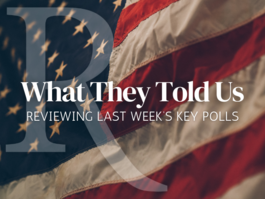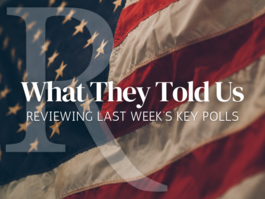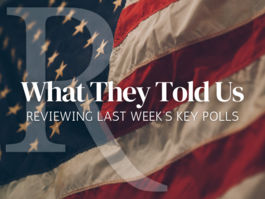Message From Georgia: This Too Shall Pass
A Commentary by Michael Barone
The world doesn't stand still. Case in point: the Georgia runoff election last week made necessary because Republican Sen. Saxby Chambliss failed, barely, to win an absolute majority on Nov. 4. In that contest, Chambliss led Democratic challenger Jim Martin by 3 percent. In the runoff, he won by 14.8 percent. Same candidates, very different result.
Does this mean there has been a major shift toward the Republican Party? By no means. But it does tell us something about the balance of enthusiasm in the days after Barack Obama's historic victory. In Georgia, the Obama campaign did a brilliant job of getting black and young voters to cast early ballots and came within 5 percent of carrying a state that had voted for George W. Bush twice by double-digit margins.
Some 3.9 million Georgians voted -- a 19 percent increase over November 2004. Undoubtedly many of these new voters were eager to cast their votes for the man who will now become America's first black president.
But that level of enthusiasm was not sustained in the more routine circumstance of choosing one of two white men to serve a six-year term in the Senate. Turnout on Dec. 2 was about 2.1 million votes (with 3 percent of precincts not reporting as this is written).
For the November contest, about one-third of early voters were black; for the December contest, it was about one-quarter. Examination of the county returns suggests that black turnout lagged far behind November except in the inner Atlanta metro area, where black political organizations have been active for several decades. Young voter turnout was, I suspect, down markedly, as well. All of which suggests that the enthusiasm that played such a large part in Obama's November victory may not be there for Democrats in elections when Obama is not on the ballot.
Other factors were in play, as well. With 58 Democrats elected to the Senate and the race in Minnesota in the recount stage, a Martin victory might have meant that Obama's party would have the 60 votes it needs to break any Republican filibuster. Many voters interviewed at the polls said they didn't want to give the Democrats all that power. Americans tend to like checks and balances, particularly if, as is the case in Georgia, most of them don't tend to favor the party that threatens to win all-out control.
In any case, the widespread and growing approval of Obama's performance as president-elect did not motivate a high Democratic turnout. It may even have dampened it. Obama's choices for high positions -- keeping Robert Gates as secretary of defense, installing Gen. James Jones as national security adviser, appointing New York Fed Chairman Timothy Geithner as secretary of the treasury -- have won widespread approval from the public and drawn cheers from many conservative Republican pundits. But for voters motivated by root and branch hatred of George W. Bush and all his works -- from the Democratic base, in other words -- they may not have been the change they believed they were voting for in November. If Obama continues to govern in this vein, he may Eisenhower-like drive his own approval ratings up but generate little enthusiasm for his party.
This could be the case especially among affluent voters. In November, Obama assembled a top-and-bottom majority coalition, winning among voters with incomes under $50,000 and over $200,000, and running (narrowly) behind among those in between. But in the Georgia runoff, voters in the ring of affluent suburban counties around Atlanta voted between 64 percent and 85 percent Republican.
To be sure, this is more Republican turf than the rings of similarly affluent counties in the big metropolitan areas of the North. But it does raise the question of whether Democrats can sustain Obama levels of support in affluent America if voters there do not see the recent dizzying drops in their home values and investment portfolios reversed over the next few years.
There's a danger of extrapolating too much from a single election held in unusual circumstances that are not likely to be precisely replicated elsewhere. But one lesson of political year 2008 is that voters' preferences are subject to sharp shifts in a period of what I have been calling open-field politics. An Associated Press-Yahoo series of 10 polls over 12 months showed that 14 percent of voters switched candidates, and John McCain had a clear lead in most polls when the financial crisis hit in mid-September.
The world isn't likely to stand still in the months and years ahead, and the Georgia runoff result is one more piece of evidence that many political outcomes are possible.
COPYRIGHT 2008 U.S. NEWS AND WORLD REPORT
DISTRIBUTED BY CREATORS SYNDICATE INC.
See Other Political Commentaries
See Other Commentaries by Michael Barone
Views expressed in this column are those of the author, not those of Rasmussen Reports.
Rasmussen Reports is a media company specializing in the collection, publication and distribution of public opinion information.
We conduct public opinion polls on a variety of topics to inform our audience on events in the news and other topics of interest. To ensure editorial control and independence, we pay for the polls ourselves and generate revenue through the sale of subscriptions, sponsorships, and advertising. Nightly polling on politics, business and lifestyle topics provides the content to update the Rasmussen Reports web site many times each day. If it's in the news, it's in our polls. Additionally, the data drives a daily update newsletter and various media outlets across the country.
Some information, including the Rasmussen Reports daily Presidential Tracking Poll and commentaries are available for free to the general public. Subscriptions are available for $4.95 a month or 34.95 a year that provide subscribers with exclusive access to more than 20 stories per week on upcoming elections, consumer confidence, and issues that affect us all. For those who are really into the numbers, Platinum Members can review demographic crosstabs and a full history of our data.
To learn more about our methodology, click here.



